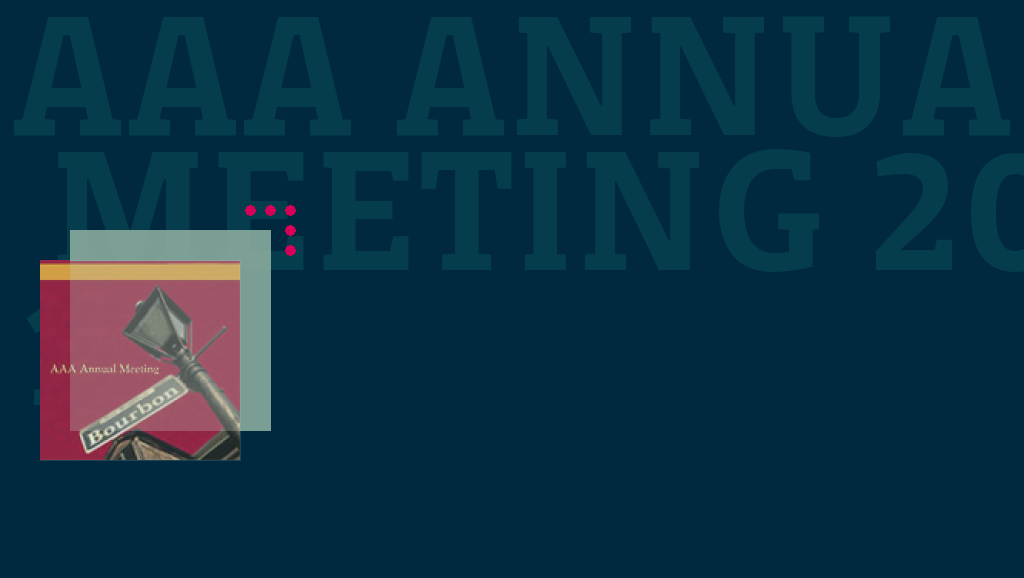The Bassetti Foundation participates in the 2010 American Anthropological Association Annual Meeting which will take place in New Orleans, Nov. 17-21, 2010.
Cristina Grasseni will be discussant of the panel “Sustainable Innovations: Forging partnerships, knowledge exchange, and reciprocity“. The panel will focus on strategies of sustainable development in the highlands of the EU, USA and Canada and on how communities adapt to their environment in an era of climate change, resource scarcity, political challenges and socio-economic constraints.
THE CALL FOR PAPER IS OPEN TILL APRIL 1ST, 5 PM EAST COAST TIME.
Organizer: Cristina Orsatti
Contact: cristina.orsatti@iasma.it
IASMA Research and Innovation Centre – Fondazione Edmund Mach
Environment and Natural Resources Area – Climate Change: Impact and
Adaptation (CCIA)
For more information please visit the AAA meeting site
Sustainable Innovations: Forging partnerships, knowledge exchange, and reciprocity
Sustainable development implies social, environmental, and economic change in the ways in which the natural, the social and the economic environments are perceived, valued, preserved, constructed and managed.
The economic paradigm of growth cannot prevail on one of sustainable development. The ways in which human, social, environmental and economic development relate to each other should be analyzed in relation to diverse views and practices of development in specific sites of interest and in relation to expert and indigenous knowledge. Responsible innovation depends on grounded knowledge. This panel focuses on the role of partnership, knowledge exchange and reciprocity in ecological, economic and social sustainability. In particular, the speakers highlight the relationship between the circulation of commodities and service, values and people, and information – and how this reverberates on territorial, ecological and indigenous resilience. Several of the panelists will discuss how highland communities adapt to the environment in an era of climate change, resource scarcity and socio-economic and political constraints. Which adaptation strategies are “sustainable”, and for whom? How do specific territorial practices mingle and mix, to survive in the global scenario?
We are interested in analyzing contexts and looking at how they adapt and react differently to global challenges. Identity and culture are not always recognized as practically valued resources, to promote development strategies. But, if grounded in territorial contexts, identity and culture can highlight sustainable and unsustainable ways of adapting to the environment.
Within a comparative framework, the unfolding relations between humans and their environments outline what needs to be changed, what needs to be implemented or maintained in a specific context. The crystallization of beliefs and practices of the past do not necessarily promote the sustainability of social, ecological and economic environments. Nor is the circulation of beliefs and practices per se fruitful to community sustainability (let us think of the impact of “expert management” and of the plundering of local resources from indigenous communities). Flows of knowledge, people and capitals may constrain, disrupt or stop other types of flows.
We wish to find examples of good practices, where the circulation of knowledge, commodities and relations is sustainable and respectful of culture and identity. We will examine the institutional and economic models behind specific development practices, and compare the opposite tendencies towards “crystallization” (closed social circuits) or “flow” with a view to the sustainability of specific natural, social, and economic resources. Another issue of interest here is that of boundaries and constraints. Which skills within and across disciplines can help us analyze highland contexts from different points of view (cultural, economic and ecologic) but with methodological rigor and within a common language? Several of the panelists present papers about the Alps, which have seen dramatic environmental changes and demographic decline in the last fifty years and where ecological, economic, social and demographic sustainability are absolutely crucial to development and innovation.
















